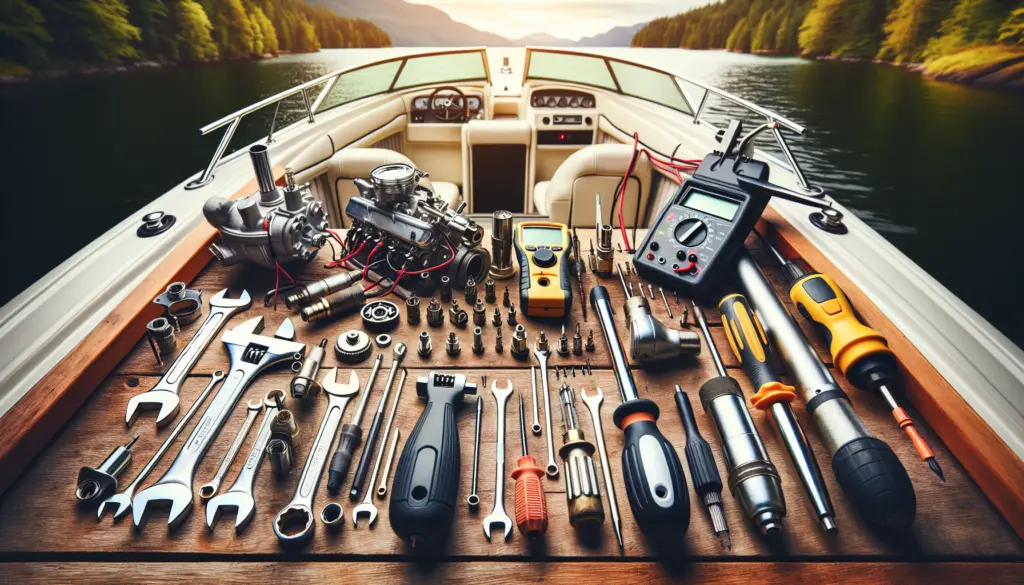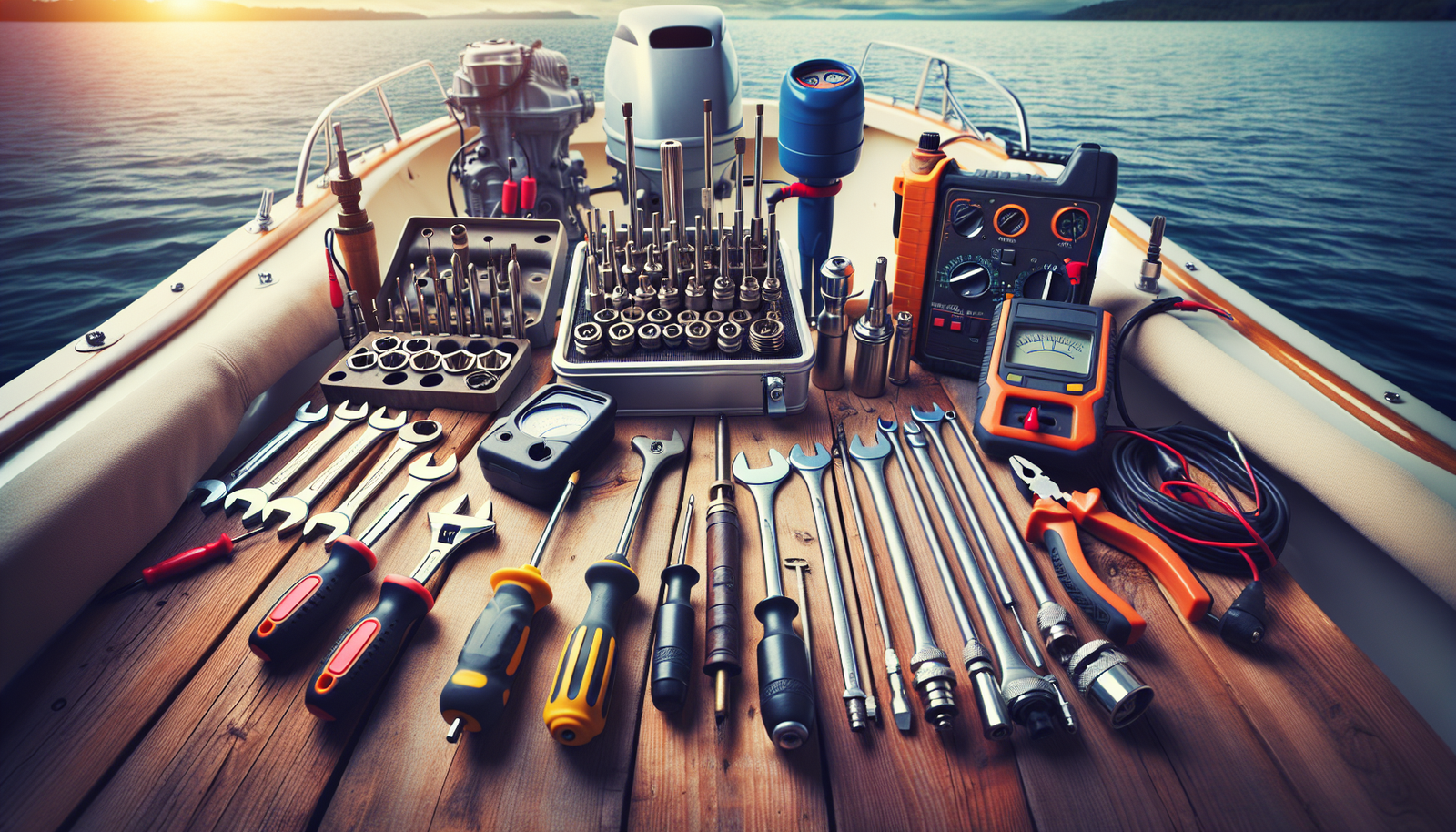Imagine you are on a refreshing boating trip, and suddenly, your boat engine fails. What a nightmare, right? The good news is you can maintain and repair your boat engine by yourself with some special tools. “Must-Have Boat Engine Tools for DIY Maintenance and Repairs” is an all-in-one guide for boating enthusiasts like you. It covers a comprehensive list of necessary tools for regular checkups and emergency repairs of your boat engine, allowing you to keep your boat in ship-shape without the need of a mechanic!

Why is DIY Boat Engine Maintenance Important
There’s a profound sense of satisfaction you get from ensuring your boat operates perfectly. At the crux of this is engine maintenance — tending to the heart of your boat regularly. One of the significant reasons why DIY boat engine maintenance is essential is due to the relevance of regular upkeep.
The relevance of regular maintenance
Regular maintenance goes a long way in preventing severe issues that could lead to expensive repairs or even replace the whole boat engine. When you maintain your boat regularly, you’ll notice any minor problems right away and address them before they worsen. For instance, detecting a minor oil leak early can help you prevent lasting damage that could require a complete engine overhaul.
Cost-effectiveness of DIY
Another reason you’d want to consider DIY boat engine maintenance is the cost-effectiveness. Sure, hiring a professional for maintenance can be expensive and quite frankly, not within everyone’s budget. When you do it yourself, you save a lot of money and can use that savings for other boat upgrades or invest in high-quality tools for future maintenance and repair tasks.
Learning opportunities and satisfaction
The process of maintaining and repairing your boat engine also offers significant learning opportunities. It helps you understand your boat better, and you’d be able to troubleshoot minor issues without professional help. In addition to learning, there is also an unparalleled satisfaction that comes with learning a new skill and applying it successfully.
Essential Safety Equipment for DIY Boat Maintenance
Safety should always be the first thing you consider before starting any DIY boat maintenance tasks. This is where Personal Protective Equipment (PPE) comes into play.
Importance of Personal Protective Equipment (PPE)
PPE is vital for protecting yourself from potential hazards when working on your boat engine. This could range from protective gloves and eye goggles to safety shoes and even a face shield. Not only do they keep you safe, but they also ensure you are comfortable enough to focus on the task at hand.
Specific type of PPE for different tasks
Different tasks will require different kinds of PPE. For instance, while working with hazardous chemicals or solvents, you’d want to have protective gloves and safety goggles. When performing tasks that require heavy lifting or that might lead to falling or sharp objects, safety shoes become essential.
Benefits of using safety equipment
The benefits of using safety equipment can’t be overstated. First and foremost, it protects against potential injuries. Second, it fosters a safe working environment, ensuring you can perform maintenance tasks without fearing any harm.
Mechanical Hand Tools Required for Boat Engine Maintenance
There are a variety of mechanical hand tools you’ll need for effective boat engine maintenance; here are a few of them.
Use of screwdrivers
A screwdriver set is an essential tool for any boat engine maintenance task. It’s used to tighten or loosen screws in different parts of the engine. Having a set of screwdrivers of various sizes and types ensures you’re equipped for any situation.
Need for a socket set
A socket set is just as essential for boat engine maintenance. It’s necessary for tightening and loosening nuts and bolts. A comprehensive socket set that includes different socket sizes makes it much more manageable to handle nuts and bolts of varying sizes.
Importance of pliers and wrenches
Just like screwdrivers and sockets, pliers, and wrenches play a critical role in boat engine maintenance. They come handy in gripping, pulling, bending, or turning objects that cannot be manipulated by hand. Wrenches, on the other hand, are great for providing grip and mechanical advantage in applying torque to turn objects.
Utility of hammers and mallets
Hammers and mallets are useful for driving fasteners and breaking up objects. A rubber mallet can be handy in nudging parts into place without causing damage, while a regular hammer might be helpful for harder impacts.

Electrical Tools Critical for Boat Engine Repairs
If you’re going to be handling the electrical components of your boat engine, there are several tools you must have.
Role of multimeters
Multimeters are multi-functional electrical tools designed to measure voltage, resistance, and current in your boat engine. With this tool, you can troubleshoot electrical issues and ensure everything is functioning as it should.
Why you need a soldering iron
A soldering iron is another crucial electrical tool. It’s used to join broken electrical connections, thereby fixing electrical problems that might impede your boat’s performance.
Understanding wire strippers
When dealing with electrical tasks, you would often have to connect wires. Wire strippers will be the tool for this job as they help in cleanly removing the insulation from the wire without causing damage.
Need for electrical tape
No electrical toolbox is complete without electrical tape. It’s used to insulate wires, preventing potential shorts, and electrical shocks.
Specialty tools for Boat Motor Maintenance and Repair
When it comes to boat motor maintenance and repair, there are certain specialty tools that you may require.
Function of prop wrench
A prop wrench is used to install or remove propellers. It’s specially designed to fit around the propeller nut, making it easy to do the job without causing any damage.
Utility of spark plug gapper
A spark plug gapper is a tool used to measure the gap between the spark plug terminals. Any discrepancies in this gap could lead to the engine misfiring or running irregularly. Regular checks with a spark plug gapper can help prevent this.
Importance of piston ring compressor
A piston ring compressor is a specialty tool used during the replacement of piston rings. It compresses the rings to fit into the cylinder, making your job a whole lot easier.
Usefulness of carburetor synchronizer
A carburetor synchronizer aids in checking the vacuum pulses on multiple carburetors simultaneously. This is essential to ensure they are all working correctly and the engine is running smoothly.
Value of fencing pliers
Lastly, fencing pliers, while not initially designed for marine use, are a versatile tool in boat engine maintenance. They can cut, twist, grip, and even hammer, making them useful in various tasks.
Marine Diagnostic Tools for Efficient Troubleshooting
Advanced marine diagnostic tools can prove very useful in identifying and solving many engine performance issues efficiently.
Benefit of marine engine diagnostic system
A marine engine diagnostic system provides valuable data about your boat’s performance by analyzing the engine’s inputs and outputs. It helps you spot issues accurately and quickly, saving you time and money in the long run.
Need for compression tester
A compression tester is used to check the condition of your engine’s cylinders. If the compression in the cylinders is off, your boat’s performance could be affected. Regular checks with a compression tester help to keep this in check.
Utility of oil pressure gauge
An oil pressure gauge helps in monitoring the oil pressure in your engine. Any variations in the oil pressure can indicate potential issues like leaks, blockages, or even the need for oil changes.
Important Cleaning Tools for Boat Engine Maintenance
Engine maintenance isn’t just about tightening screws and diagnosing problems. Keeping your engine clean is just as important.
Role of brushes in cleaning
Brushes of various sizes and stiffness are an essential part of engine cleaning. They can help remove dirt, dust, and grime from all corners of the engine.
Why you need degreasers and solvents
During engine maintenance, you’re likely to come across grease and oil stains. This is where degreasers and solvents come in handy. They help break down and remove these stubborn stains, keeping your engine clean and working efficiently.
Importance of engine clean-up
A clean engine doesn’t just look good; it also optimizes the performance of your boat. Regular cleanups can help in preventing the accumulation of grime and corrosion that could lead to malfunction and premature failure of engine parts.
Essential Storage and Organization Tools for Maintenance
All these tools require a proper storage and organization system to ensure you’re making the most of your time during engine maintenance.
Importance of a toolbox
Having a toolbox is crucial for keeping all your tools safe, organized, and always ready for use. It can help you quickly find the exact tool you need, making your maintenance tasks more efficient.
Organizing your maintenance tools effectively
Efficient organization of tools is not just about cleanliness but also about accessibility. Sort your tools based on frequency of use, type, or size. This way, you’ll know exactly where each tool is, making your work a lot easier.
Benefits of proper tool storage and organization
The benefits are straightforward. First, it prevents loss of tools. Second, it saves you the frustration of searching for a tool in the middle of a task. Finally, and importantly, it extends the lifespan of your tools by protecting them from damage, moisture, and rust.
Performing Regular Maintenance with These Tools
Once you’ve gathered all the required tools and familiarized yourself with their uses, it’s time to perform regular maintenance on your boat engine.
Routine inspection and cleaning
Ensure you perform a routine inspection and cleaning of your boat’s engine. Ideally, this should be done each time before you head out on the water. Inspecting and cleaning the boat engine regularly would ensure maximum efficiency and lifespan.
Frequent diagnostic checks
Make use of your diagnostic tools to perform frequent checks on the engine. This can help in identifying potential issues early and preventing them from accelerating into bigger problems.
Scheduled repairs and adjustments
If during your checks, you spot something wrong, schedule a time for repair or adjustment immediately. Don’t put off repairs. The sooner you resolve the problem, the less damage your engine is likely to experience.
Tips on Maintaining Your Boat Engine Maintenance Tools
Your maintenance tools also require maintenance. They are an investment, so it’s important to take proper care of them so they can serve you for a long time.
Cleaning your tools regularly
Don’t allow dirt, grease, or rust to linger on your tools. Clean them thoroughly after each use to keep them in good condition.
Storing tools properly
Always store your tools in a dry and secure place. Exposure to moisture can lead to rust and corrosion, which can impair their effectiveness and shorten their lifespan.
Inspecting tools for wear and tear
Over time, your tools will experience wear and tear. Regularly inspect your tools for any signs of damage. If a tool is damaged beyond repair, consider replacing it promptly to avoid flawed execution of tasks.
By understanding the importance of DIY boat engine maintenance and using the proper tools for maintenance tasks, you’re not only extending the life of your boat but also making your boating experience more enjoyable, safer, and importantly, cost-effective.

